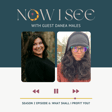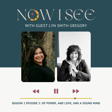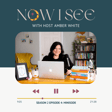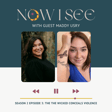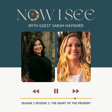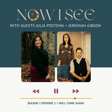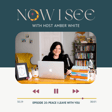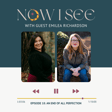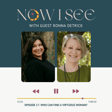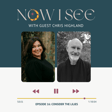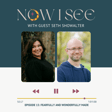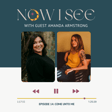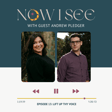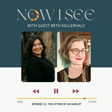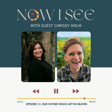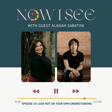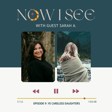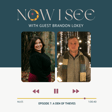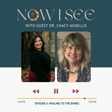Become a Creator today!Start creating today - Share your story with the world!
Start for free
00:00:00
00:00:01

Glory in the Church: Rethinking What Church Has Been with Rev. Dr. Marcia Mount Shoop
Not everyone who deconstructs their faith wants to leave it entirely. For so many, reconciling with the faith they love and are deeply connected to isn’t part of their journey. But are there really churches out there doing things differently than what so many of us are used to? And what could it look like for a church itself to deconstruct old patterns, deeply rooted history, and its own wrongdoings?
In this episode, I’m talking with Rev. Dr. Marcia Mount Shoop, lead pastor at Grace Covenant Presbyterian Church in Asheville, NC. Together, we discuss GCPC’s unique approach to church community, including its dedication to dismantling white supremacy, examining power structures, and rethinking the way things have always been.
Resources
- Read Rev. Dr. Shoop's Book Let the Bones Dance: Embodiment and the Body of Christ
- Learn More About Grace Covenant Presbyterian Church
Links
Transcript
Introduction to 'Now I See' Podcast
00:00:01
Speaker
I was lost in utter darkness I was trapped in toxic shame I was bound by my religion Till I chose to break away
00:00:24
Speaker
Now I'm finding my true colors For the first time I feel free Now I'm learning self compassion And as I heal I'm finding peace
00:00:51
Speaker
Welcome to Now I See, eye-opening stories from the formerly faithful.
Stories of Transformation and Faith
00:00:56
Speaker
I'm your host, Amber White, and here, me and my guests share our experiences in loving and leaving rigid faith systems. Together, we shine a light on the dark corners of these institutions and share the joys of rebuilding life on our own terms. I promise you'll leave inspired, even if you are a little teary-eyed.
00:01:23
Speaker
Hi, and welcome back
Addressing Criticism and Church Accountability
00:01:25
Speaker
to Now I See. I'm your host, Amber White, and today I'd like to start off this episode by clearing up a few things. I've received a few messages from people saying things like,
00:01:40
Speaker
I can't believe that you're attacking the church or that I'm bitter or angry or my favorite one so far that my fate will be worse than that of a non-believer because I've known the truth and rejected it. There really is no hate quite like evangelical love, is there?
00:02:02
Speaker
I'm not surprised by any of it, and if you remember from my first episode, I knew these exact things would be said about me. It's almost like I know the manipulative patterns after 20-plus years of deep indoctrination and experiences with it.
00:02:18
Speaker
Wild. So let me set the record straight. I do not hate the church, and I do not hate God. In case you missed the episode so far, I've already had more than one guest who is working to find ways to reconcile with their faith. These are people who love God, and I love them and support them wholeheartedly in their faith journey.
00:02:45
Speaker
In this episode, I have a minister from a phenomenal church that I am still so honored to have served in, even if I'm not currently attending. I know how easy it is for nuance to get lost in our world, so I'm going to lay this out as plainly as I can.
00:03:05
Speaker
Respecting and loving the church and pedestaling and idolizing the church are different things. And far too often,
Impact of Information and Church Transparency
00:03:15
Speaker
the church is being pedestaled and idolized, and it prevents it from being held accountable, as all institutions and people in power should be.
00:03:27
Speaker
Churches have been getting away with atrocities for centuries. They've used their power and influence to do unspeakable cruelties to people of color, women, the queer community, and anyone and anything that feels like a threat.
00:03:46
Speaker
It used to be that people didn't know about these things, but we live in an age of information now. People can see what was said and done. They can easily learn how the Bible was formed and how it's been added to and misinterpreted to suit particular narratives. And they can see right through the attempts at justifying it all, right down to the outright bullying some will do when backed into a corner. It feels like anyone who speaks up and questions it
00:04:18
Speaker
is called a heretic, a reprobate, a prodigal child who will inevitably come back after being punished enough for using their God-given voice to call out wrong and ask for a better way. Churches love to cast blame on the devil, the culture, education, working women, you name it, for declining numbers in church attendance around the world. But they hate to look inward.
00:04:51
Speaker
The thing is, though, no church, institution, workplace, or even family structure can be healthy that can't acknowledge the damage it has done, that can't openly accept the things it got wrong and do what they can to make amends.
Guest Introduction: Reverend Dr. Marsha Mount Shoop
00:05:13
Speaker
We all get things wrong. There will never be a perfect. But what we're seeing from these types of churches can't even be qualified as trying. It's the same lazy cultishness that we've come to expect. And if it continues, it will die. We're seeing it happen now.
00:05:39
Speaker
This is what I'm speaking up against with this podcast. This is where I believe the bulk of the issues lie. Well, that and in a severe lack of critical thinking skills combined with an absurd level of audacity and ego. So why do I have a minister on today's episode? Well, I'd like to show how it's possible to do things differently.
00:06:09
Speaker
especially for those who don't want to lose their connection to the faith that they love so dearly. Church is also a community, something that is sorely lacking in our society, and it's the one thing people who leave their faith say that they truly miss.
00:06:29
Speaker
I had the pleasure of meeting the Reverend Dr. Marsha Mount Shoop and the Grace Covenant community in 2018, about eight years after I left fundamentalism. Up until this, I held church at arm's length. I visited a few churches early on, but eventually I only went if I was visiting my parents, out of a sense of respect and not wanting to rock the boat.
00:06:56
Speaker
But one evening, as I was talking with our dear friend Jenna Graham and stating very firmly that I just could not be a part of something that treated the queer community like shit, she shared the idea with me that God never asked anyone to do that. And my mind was blown. It sent us on a journey to check out some churches together. Neither of us expected what we got and Grace Covenant.
00:07:27
Speaker
Try as I might, I can't really explain the deep sense of peace and community I experienced on that first visit. And in my subsequent years there, during which I served as a deacon, a Sunday school teacher, panel guest, and even co-chair the fundraising committee where I got the very fun and delightful job of playing the abundance fairy. Like most everything I do in my life, I was all in.
00:07:55
Speaker
And little by little, I began to really heal some of those deep religious wounds that had been begging
Journey to Ministry and Grace Covenant
00:08:02
Speaker
for some salve for so long. While I'm no longer in attendance there, or even at any church, I have immense respect for and gratitude to Marsha and the Grace Covenant community for how they have impacted my life for the better.
00:08:20
Speaker
and I believe in the amazing work they're doing in the Asheville community and far beyond. I've also never met a minister quite like Marcia, and I mean that with the highest praise. You'll see what I mean in this episode.
00:08:38
Speaker
I am also so grateful for the ministers and churches out there that are doing the work that needs to be done and creating opportunities to see things differently, heal deep and sometimes centuries-old wounds, and be an integral part of bettering their communities any way they can.
00:08:57
Speaker
If you'd like to learn more about Grace Covenant, I've included a link to the church in the notes, along with a link to Marsha's book, Let the Bones Dance, Embodiment and the Body of Christ. In this book, she explores theology that is attentive to the physical experience, not just the emotional, mental, and spiritual that we're used to.
00:09:21
Speaker
You'll hear us talk a bit about embodiment in this episode, and I am always fascinated by how Marsha brings embodiment practices into a service. It's really special.
00:09:34
Speaker
And finally, this episode is dedicated to Laura Ross, a member at Grace Covenant who recently passed away. May you rest in peace and glory, Laura. I'm grateful to have known you for a while. I hope one day my presence is as peaceful and loving as yours felt to me. Okay, now that I've finished our longest introduction yet, let's get into the episode.
00:10:13
Speaker
Hi, Reverend Dr. Marcia. I am so excited to have you with me on Now I See Today. It is an honor to have your experience and your heart here with us. Thank you. Thank you, Amber. I'm so honored to be invited and it's wonderful to just have time to talk to you and be with you and spend time with you. So thank you for the generous invitation. Oh, my pleasure.
00:10:36
Speaker
Okay, so as I start up every episode, I like to ask my guests to set the scene and tell us a little bit about your background with Christianity, maybe a little bit about how you came to be a minister and
Building Community at Grace Covenant
00:10:50
Speaker
what it's like to be building the community at Grace Covenant. Okay, here we go. So I say to people often, you know, there's something that
00:11:03
Speaker
If you just are on the surface with my call story, it sounds kind of boring because I'm the fourth generation ordained to the ministry and my family. And I'm the first woman. So my great grandfather, my grandfather, and my father ordained ministers in the Presbyterian church. So that's the kind of like, oh, whatever, you know, you're part of the Presbyterian, like little clan of people that have multi-generational pastors.
00:11:31
Speaker
The more interesting layer of it is that I didn't want to do this at all. I was very resistant and fought it at every turn. I was going to law school out of college. Then I worked in a law firm and realized that I hated it. So I actually applied to joint degree programs in law and divinity. And after a year in mission,
00:11:55
Speaker
started at Vanderbilt and a joint degree program in law and divinity there at Vanderbilt University. And something just made me start at the divinity school. It was while I was in New Mexico as a volunteer and mission for the Presbyterian Church that I thought, I think I want to see what divinity school is. Not connecting that to, I want to be a minister, you know.
00:12:18
Speaker
And so I started at the divinity school and then never got to the law school. I just kept deferring. And finally the Dean of the law school said, you're not going to come here, are you? And I was like, I don't think so. So after I was done with divinity school and sort of half heartedly involved in the ordination process in the Presbyterian church, I went straight into a PhD program at Emory University and got my PhD in religious studies with a focus on constructive theology.
00:12:47
Speaker
And that was just, when I look at my 54 years so far, it has been some of the best years were those years at Emory. I just really enjoyed studying religion and had wonderful professors and colleagues. But it was there that I realized I don't want to be an academic. I can do this. I'm good at it. And my dad chose academia. He was a
00:13:16
Speaker
ordained minister, but he spent his career teaching in a liberal arts college in Kentucky. So it was there during that program that I realized, hey, I actually want to be a part of a community where we believe something, where we're building something. And that was while I was working on my PhD that I got my first call to ministry in the Chicago Presbytery.
00:13:40
Speaker
yeah, to a church that was just like on paper. I just would never think I would want to serve that church, you know, white, suburban, rich, you know, kind of conservative, you know, but they really taught me who I am as a pastor, as a preacher, as a teacher. Yeah. They, they helped me see myself in a new way. So that's kind of how I got to ministry and what it's like to be at grace covenant is,
00:14:09
Speaker
I'll say I'm going to start with the word intense because beauty is intense and also healing is intense. And also just church. Church is tough. It ain't for the faint of heart. And Grace Covenant is an amazing community.
00:14:30
Speaker
When I was interviewing here, I kept saying to my husband, this church is too good to be true. It's just too good to be true. There's no way. They're actually interested in the things I'm doing. And what I've found since I've been here is that, yes, in some ways it's too good to be true. And then in other ways, it's a church. And so all the tough things that happen in churches happen at Grace Covenant. The wonderful, beautiful healing
00:14:59
Speaker
just spirit led thing is that really God is helping us to figure out how to use those ugly parts to heal. And instead of kind of avoiding them, we're leaning into them where that comes in waves. It's not all the time, but you know, we go through these times when there's reactivity, especially in the way white people like to do in churches. And I've just seen the church really lean in and
00:15:29
Speaker
And the transformation is awe inspiring. And so I just, I think someday when my work is done at Grace Covenant, I'm gonna take a long nap and then I'm just gonna say, God, you're amazing. You know, that was amazing. Yeah. It's amazing. Getting a little teary. I know, me too, because I remember so many of those hard things from my time there. Yeah.
00:15:56
Speaker
My guests don't know this yet, but I was a deacon there for a few years and I attended for a while before that. I was drawn to
Challenging Traditional Practices and Inclusivity
00:16:04
Speaker
Grey's Covenant for those reasons. There were never any illusions
00:16:09
Speaker
of perfection. I remember walking in there and being so excited to see a woman behind the pulpit. And I don't know if you know this, but that's the first time I'd ever heard a woman preach to me. It was a big deal. And I was so excited. It's like, Oh my gosh. And like, you know, because I think I'd heard most of my life and I attended a very different kind of Bible college that women weren't capable of that. And then they were not capable of understanding the theology.
00:16:36
Speaker
and they were not allowed to, I remember being so mad at Bible college that I wasn't allowed to take certain theology classes because I was a woman. And being so infuriated, because deep down even then I knew that that's not true, right? Like that's just not true. And so it was very exciting to me to see so much representation in so many ways, not just women in leadership, but there were queer people in leadership. There was a different feeling in that church than I'd ever felt before. And it's not easy to get there.
00:17:07
Speaker
when you're in a group of people that are traditional and are used to a tradition. My experience with the Presbyterian Church is that it's very traditional in a lot of ways. And very, very intellectual, I would say, too. Yes. Part of what Grace Coven is doing is really asking people to be more present to our bodies and how we're feeling, and that just really scares Presbyterians a lot.
00:17:35
Speaker
I remember the first time I had a conversation with a church member who'd been there for a while and you know me, I have a vibrant personality. Yes. And they were so visibly scared of me because I was just having this great, vibrant conversation and they were like, okay. Yeah. Cause they've just been formed. Yeah. They've been formed in this whole different way to be at church. And I call it a low anxiety system though, because even with those folks,
00:18:05
Speaker
that doesn't translate into a lot of rigidity around like how we do things, which is very rare. It really is. It's rare in a Presbyterian church. The church was really, the membership was, they were really great about embracing change. Yeah. And I remember one time we did like a Reiki moment before a sermon. Yeah. And everybody was so excited about it. And that was a cool thing to see too, because that was food for a lot of people.
00:18:34
Speaker
Yes. But they were excited to be in community together and that's beautiful. It is. It is beautiful. It's an amazing place with some truly amazing people. It really is. Heart-centered people. Just one of the things I thought was really lovely too in my time there was seeing folks embrace scripture being taught differently.
00:18:58
Speaker
it kind of being turned on its head. Things that were once used to shame people were being put into historical and cultural context in a way that showed just how they were meant to be human focused and they've been abused and turned into tools for power. I remember one in particular was a sermon you did on the woman at the well. I had always heard that scripture as Jesus saw her sin, right?
00:19:27
Speaker
he, oh, she was married five times, you know, and all those words come up like slut and whore, you know, all this stuff. And like, well, he saw that and he was like, well, you know what, you're still worthy of me anyway. And that's how it was taught. And like, what an arrogant, what an arrogant Jesus, right? Like to, yeah, to teach it that way. But you taught it as she had been the subject of a law or a cultural standard. I can't remember which one it was.
00:19:55
Speaker
that if her husband died, she had to then marry his brother or his next kid. And like, that's horrifying. That's a totally different hurt that Jesus was addressing. And I heard that and just started weeping. It still makes me very emotional talking about it right now because that's just a different gospel and people were embracing it.
00:20:19
Speaker
I was just going to say that's a great example. I'm glad you landed it there with The Woman at the Well. I just preached about The Woman at the Well a few weeks ago, and the sermon was a poem. The whole sermon was a poem. And while I was preaching, there were two women around a window that we're using during Lent as an art installation that's kind of emerging. And they were putting cloth prayers on the
00:20:49
Speaker
exterior of the window and that was sort of a simulated well and it was just so powerful. There was a moment there where we're all kind of in this kind of collapse of time where we are starting to understand the way that this story and that well got poisoned and
00:21:18
Speaker
It was so powerful. It was a spirit filled moment. And just the gratitude that I felt for the way that a community coming together and being able to take up the broken pieces and start to put something back together together. And this beautiful vision starts to emerge of
00:21:46
Speaker
what Jesus really was about. And there's just so much freedom there. There's so much healing there. And this, that language of the living water, the living water is the water that will make us stop coming to this poison well and draw from the well that will give us life and life that never ends. Life that's so tangled up with everything that's alive that it goes on.
00:22:16
Speaker
and on, and that story of the woman at the well, and to read it with a social cultural lens, but also to read it with the lens of empire and the way that empire appropriated scripture and used it to do the opposite of what Jesus came to do in the first place.
00:22:40
Speaker
And kind of starting to unravel that for ourselves and starting to see ourselves as being able to shake out of some of that is just really powerful. And it's embodied. It's not just in our heads. It's not just hearing a different interpretation. It's a feeling of being in a space where we're at this different well, that's the well where Jesus really came and where he really said, I see you.
00:23:08
Speaker
I see how you have been carrying the weight of your culture's oppression. And I see you. And it's just, it was just beautiful. It really was. That's powerful. I think as we watch the rise of Christian nationalism happening. Yeah.
00:23:31
Speaker
And I lived with and grew up around people who are very much on the Christian nationalism train. Thinking of that life-giving well, that's a totally different thing than what we're watching unfold on the political stage in America right now. And I think even to an extent globally, but especially in America.
00:23:54
Speaker
Yes. And I mean, when you listen to the Woman at the Well story, it is Jesus basically saying, listen, sister, the day's going to come when we don't worship at any, we don't see anything as a holy place as opposed to something else. It's the whole world. And that was Jesus very clearly saying, I am not the God of one nation. I will never be.
00:24:23
Speaker
associated with one nation. There's this cultural, you know, kind of, Jesus is able to move across cultures and not erase that other culture. And again, look at what Christianity did when empire took it over. It did the opposite. It eradicated other cultures. It was the authorization of genocide. And this is Jesus saying the total opposite.
00:24:52
Speaker
This is Jesus saying, like, I will never be that. I will always be this other kind of tapping into divine love that doesn't stop at national boundaries or barriers or state lines or whatever. Cultural norms, genders. Yes. And I don't play that.
00:25:19
Speaker
I'm going to come here to the well. I'm going to talk to you. I'm going to be with you." And his followers are still kind of like, what are you doing? Why are you doing that? Don't we need to have these rules and make sure that we're not getting tangled up with the wrong people? And Jesus is like, you're just on the wrong radio station. You're not listening to the right thing right now. That's not where we are.
00:25:42
Speaker
Right. I love that analogy. That's good. What we're talking about right now reminds me a lot of the way I learned about communion at Grace Covenant and the idea that because I, again, grew up in a system where communion was
Grace Covenant's Role in Social Justice
00:26:00
Speaker
only for church members who had been baptized and who had been, but at Grace Covenant, it was open to the community.
00:26:06
Speaker
If you wanted to come and break bread together at our table, it was open. There was never not room for you. And that was, that was a huge change. But the table wasn't a table of, we sit here very nice and neat and we eat our little piece of bread and then we go, it was a table of hard conversations. And I remember you in a sermon one time saying that those hard conversations are what make healthy communities. Because if you can't have those,
00:26:36
Speaker
then you're not a healthy community. And I think that's fascinating and true. Yeah. I mean, I feel like, and I've done a lot of writing about this, but it's been a beautiful unfolding to be in a community where we can practice communion and Eucharist in some different ways. And before COVID,
00:26:56
Speaker
We were having communion every Sunday and doing it differently every Sunday, not having it be this orderly thing. I don't know if you've heard Amber, big news, Grace Covenant news flash, we're getting the peas taken out of the sanctuary. Really? Yeah. That's been the latest place where some hard feelings have come up. Yeah.
00:27:19
Speaker
But again, it's been a beautiful unfolding and that will even open us up to more ways of gathering at the table. One of the things I critique in some of my writing and in the way we've practiced it at Grace Covenant is that the Presbyterian Church has not been a shining example of liberative communion practice. It's been a pretty rigid
00:27:43
Speaker
It feels like either you're at a cocktail party or a funeral. You can't tell what you're doing. But the communion that we're given scripturally, culturally, from what happened on that night when Jesus was with his friends before he died, is that he wanted to be with the people that he loved the most because he needed to say some things about betrayal and about their divine capacity to
00:28:13
Speaker
even when he was gone, be his body, be like him. And he didn't just say the beautiful parts. He also talked about brokenness and how that brokenness was a truth that needed to be spoken in community. And so to me, that is the model of Eucharistic practices. This is a table of truth.
00:28:41
Speaker
This is a table of healing and liberation, and so we have to come as our full selves. We have to tell the truth. Even that language has been used in other iterations of church as a way to shame people. Even the Presbyterian church back in the day in Geneva, in Scotland, would fence the table, and that meant that they would go and you had to earn your way to it. You got a coin.
00:29:10
Speaker
The elders would come and visit you and make sure you were worthy of communion. That is such a, an abomination. I think of what the table is. It is a place that mimics Jesus's table fellowship where he didn't tell people to leave the table. Sometimes they would leave because they couldn't take it, but he never asked people to leave. He asked them to come and be truthful.
00:29:40
Speaker
And he said, I can see you. I can see you in all your complexity. I can see you in your hunger. I can see you in your thirst. I can see you in your loneliness. But I can also see you in your God-given identity as somebody who's worthy to have enough. And so that's why I always say at Grace Covenant, this is a table of enough. This is a table where there's enough to go around. We don't have to hoard. We don't have to grasp.
00:30:08
Speaker
we can breathe and everybody's going to get what you need. And that practice in and of itself of just resisting the temptation to, to have a communion built on a scarcity model is a radical step in a capitalist society. It's, it's a way to say like, we're not doing that this way. We're not worried about people paying the bills or we we've got plenty and
00:30:37
Speaker
And at this meal, we're going to center the joy of enough, the joy of truth, the joy of shared vulnerability. And that's something we have to practice over and over again. Cause we don't know how to do that very well in our culture. We really don't norm. That's right. Yeah. So I'm just grateful to be in a community where we're, we are practicing, we are practicing. We don't get it right.
00:31:05
Speaker
you know, all the time, but we, we are practicing and we, and we're finding our way. It's tough work. It is. It's, it's tough work, but it's also just really, I mean, to me, it's just so real with a capital R like this is like humans trying to figure out a better way to be human together. And so I'm all, I'm all in. I can't do anything else. That's, that's what I'm wired for. So true.
00:31:33
Speaker
You know, as you talk about scarcity mindset, it brings to mind some national news stories of churches who closed their doors during disasters or who closed their doors when their communities had needs. And something I've been inspired by again and again is Grace Covenant's physical building and the way that you use it. So the doors are open for groups to come in
00:32:01
Speaker
and use the space. I'd love for you to talk a little bit about that. Yeah, that's been another amazing thing. And really, again, the rubber hit the road during COVID. COVID was like a moment of truth for Grace Covenant. And when we weren't using the building, when church was shut down, the session voted to
00:32:27
Speaker
to open the building to Youth Transform for Life, which is a black and brown led after school program for black and brown kids in the public schools in Asheville, Buncombe County. So YTL was using our building five days a week, all day, for months and months and months when we weren't even having church. They are one of our deepest partnerships now. They're still in the building. We share space. They have
00:32:57
Speaker
sometimes I think 80 kids, 60 to 80 kids, especially in the summer where they have an all day summer camp. But this is a program where kids, they do mindfulness stuff, they have homework support, they build community, they have fun, they spend time outside interacting with our community garden, they're growing things. It's just an amazing program and Grace Covenant is their home. This is their building too.
00:33:27
Speaker
And so before COVID, I would say Grace Covenant was just so busy, you know, just like all the time, every group, this group, that group, all these groups. Now we're getting back to that. Lots of groups, lots of groups. But during COVID, the fact that our building could be used for this transformational space for kids who did need
00:33:53
Speaker
support did need a place to go where their parents who were some frontline workers had to go to work. They couldn't not go to work. And some of them didn't have a great internet connection at home or whatever. It was a place for them to come and hang on, you know, because COVID was so hard and that hardness and that heaviness especially got carried by communities of color. And so,
00:34:20
Speaker
The fact that the building was able to be a concrete embodiment of what we say we value the most, which is liberation and transformation and really dismantling the way supremacy culture has wounded all of us. It just felt like, again, a movement of the spirit.
00:34:42
Speaker
And YTL and GCPC continue to grow our partnership. It continues to get deeper and deeper. And the future I can say is only more exciting than the present to think about what might be in the future for us together.
00:34:58
Speaker
as we look at things like possible building renovations or dedicated space instead of shared space for YTL and maybe doing some other stuff like affordable housing with part of our property. And I mean, there are just so many ways that we're starting to dream together that is really beautiful. I love that those dreams are not just for your own comfort. Yeah, they're not just for the congregation. And that's one thing I will say, Grace Covenant has never
00:35:27
Speaker
just been about itself. It's never been just, let's just be the church over here in our little bubble. It's always been all about engagement in the community and that has had different manifestations, but its current manifestation is really around racial equity and the liberation that we all need, all people, white, black, brown, everybody.
00:35:55
Speaker
needs from the way that we've been formed in a community, in a culture, and in systems that have separated us. So yeah, Grace Covenant has always been about, we're not just a church, we're a community.
00:36:15
Speaker
Even the community garden isn't just for the members. You're donating thousands of pounds of vegetables to shelters and to food banks. That's incredible. Yeah, 10,000 pounds a year, just about. And people donate their time to do this. It's amazing to me. And it's not just church folks. It's neighborhood folks. It's community partners. And the other thing that's not just for Grace Covenant, not a lot of people don't know this, but our memorial garden.
00:36:42
Speaker
is one of the only places where anybody in the community can inter their ashes there. It's not just for church members. And that was from the get-go. The vision of the church is that it would be an open memorial garden where people can... There is a small fee that you pay to be interred there, but you don't have to be a church member. You don't have to be connected to a church member.
00:37:11
Speaker
And so that space too is a place where community can be. It's a sacred place. I remember one of the favorite things I participated in was room in the inn. Oh yeah. Where we housed women who were in a shelter overnight and people would volunteer and take shifts to stay up all night with them. And there were the showers, that great bathroom downstairs. I can't remember if we installed that while I was there. We did all that renovation that was
00:37:39
Speaker
In 2016, 17, when I first got here, that renovation was underway for showers and laundry facility and things like that. It's just incredible. I mean, yeah. And then COVID hit and room in the end is no more. Really? And Grace covenant has been very involved in what's now what, you know, for during COVID they used an area hotel.
00:38:06
Speaker
So people didn't have to move around, which is a blessing. But now, you know, there's really a dearth of services and Grace Covenant has been involved in a smaller shelter space now that we held, that we provided funding and volunteers for in an alternate location. But yeah, that's an unfolding thing and Grace Covenant has also been a supporting sanctuary church where we
00:38:35
Speaker
We have discerned around our role in terms of sanctuary and providing sanctuary for folks who are struggling with immigration issues. And so just the way the church continues to kind of lean into these different ways, different ways that being church is about care that never separates itself from a liberative understanding
00:39:04
Speaker
that Christianity brings to bear on oppressive systems. So it's never just band-aids or sandwich when you're hungry, but also like, how do we get you plugged into resources and how do we look at, how do we change systems and structures that keep people oppressed? Grace Covenants, the only church I've been a part of that is able to kind of simultaneously continue to look at all those layers.
00:39:34
Speaker
A lot of advocacy churches aren't good at caring for each other. A lot of really caring churches aren't good at advocacy, but Grace Covenant is doing both and that's why they inspire me to keep going.
Confronting White Supremacy in Churches
00:39:49
Speaker
I don't know that many of our listeners would realize how much work that is. It's a lot of work and having been behind the scenes, even in a small way, there are a lot of people who get deeply involved.
00:40:02
Speaker
to make this happen. And it's remarkable to see the change and the impact that it can have. And I think we hear a lot... And we're changing too. Yeah, Amber, I like how you're saying that because one of the things I love about Grace Covenant is that we don't just think we're here to help other people change. It is a reciprocal process of transformation. We are transforming.
00:40:31
Speaker
The church is transforming lives in GCPC are transforming and then lives in our partnerships are transforming. It's like, it's not a one way street. It is an amazing unfolding of what it means to be in deep relationship and understand how we're all impacted by oppressive systems. It's just, it's not just one group, but it's all of us as humans.
00:41:02
Speaker
that need to change. Again, I don't see many places able to pull that off very well, and we don't always hit the target, but there's a faithfulness to the way the church keeps trying that is inspiring. It is inspiring. I'd love to circle back to racial equity because that's such a huge
00:41:25
Speaker
topic at Grace Covenant in something that I was really amazed to see because I was doing a lot of my own work around that because, you know, having grown up in the Deep South in a very white fundamentalist way and attending schools kind of similar to Bob Jones, that's the one people seem to know, that had books banning
00:41:47
Speaker
interracial relationships or roles banning interracial relationships until 2003. I had quite a lot of work to do around dismantling white supremacy. And while the big things like I, maybe I always thought that was ridiculous, but that's not the whole system, right? It's, there's all these things that I heard from a very young age and that I internalized that, you know, white people were better than black people. Our communities were better than black communities. We deserved things more.
00:42:16
Speaker
than black communities. And it's amazing to, when you really dig in deep and listen, just how much is in there. And so I was really impressed with the fact that, no, you didn't tiptoe into this issue. You came at it with the honesty of what it is and how terrible it is and how deeply entrenched it is. And I remember one time in the beginning of a sermon, you
00:42:44
Speaker
told a story about, I believe it was your godson or goddaughter? I can't remember now who made the comment that his grandmother said he didn't have to apologize to white people. That was my godson son, yes. Godson son. It was an incredible moment to be sitting in the congregation because the audible gasps
00:43:04
Speaker
of the congregation were so, I remember being like, Oh, this is upsetting. Like this is upsetting people. And I can be a real people pleaser. So I remember feeling this tension of like, Oh no, people are upset. But that wasn't an issue, you know, for you and for, you know, the leadership. It was a moment of honesty and of seeing something in a very real way. Yes. I think I,
00:43:33
Speaker
I come at ministry from a growth mindset. I'm growing just like everybody is. I'm a part of this. I'm preaching to myself. And sometimes in the Presbyterian church, that kind of vulnerability from the pulpit is not appreciated because intellectualization is such an idol.
00:44:01
Speaker
make it more like a lecture. Just go to some commentaries and tell us what the passage says. And for me, preaching is prophetic and it's witnessing. It's witnessing to the way Jesus has changed my life and the way that Jesus has taught me to want the world to be better than it is. And I have to start with myself and my people. And the church is my people.
00:44:30
Speaker
And I know that that's tough for white people in white collectives that are used to being the virtuous ones, the good white people. And Presbyterians like to be the good white people. They're not the, I'm sure there have been Ku Klux Klan Presbyterian people in the past, but generally Presbyterians have been the more moderate people, the professionals,
00:44:59
Speaker
able to distance themselves from that kind of extreme expression of overt racism. Ours is more the polished, like, here's how you have good manners, racism. Here's how you do church. And people don't want to call that racism. And so we've learned this kind of good, bad thing. Presbyterians want to be good. Yeah. Presbyterians in many ways are quintessential white people.
00:45:29
Speaker
quintessential progressive white people. And it's easy for progressive white people to sit here and scoff at the religious right when we're actually doing some of the most harmful things in the public square, in the church, in the schools, because we can't see ourselves. We can't see the way that we are propping up
00:45:58
Speaker
these supremacy mentalities. And boy, is it tough to kind of unravel some of that. And it's painful. And for me, as a fourth generation Presbyterian minister, as a child of two academics, my parents were both college professors, and somebody who's grew up in a family where
00:46:21
Speaker
being good was important. And by good, it meant engaged in the community, doing justice work, not afraid to stand up for the underdog or whatever it was. And this is a whole other level of healing that is very personal as well as collective. There's a lot of loss for me in it too. I've lost friends, I've lost community. There's some people who really don't
00:46:50
Speaker
like me and believe that I know what I'm doing because of that. And there is no other way through this process but truth. And the truth is that white supremacy is killing us. I mean, it's killing us. And that's what my prayer is every day.
00:47:16
Speaker
is that people in white bodies could start to understand more deeply that this is for us, too. This is for us to heal. All the things that really trivialize our existence, that really are destructive in our relationships and our bodies and our self-understandings, so many of these things got bundled up
00:47:43
Speaker
with these supremacy mentalities. It's hard to prop up a world where you always have to be better than everybody else. That's a lot of work. It is a lot of work. I mean, Enneagram 3, it's horrifying. It is, and it's a big lie. It's a huge lie. And so lies are heavy, and they're really twisted and tangly, and you get stuck, and you get caught, and you get confused, and then you have this internalized self-hatred on top of it. And you're so distant from yourself.
00:48:13
Speaker
Yeah. And this is all the legacy of racial violence and in our culture and white people's violence and terror against black and brown people is one layer of it. But then this hatred and violence toward ourselves and each other, the violence that Northern Europeans brought to this, this country,
00:48:37
Speaker
We learned that as Resmaa Menachem says, we learned that because we did it to ourselves before we got here. Our families did it to us. Our churches did it to us. Our mayors and city officials did it to us. Northern Europeans are some of the most brutal people to each other, you know? And I mean, we were some of the experts at like torture equipment and things like that. And we brought those
00:49:07
Speaker
ways of kind of bending the world to our needs, to this land. And it's killing us too. It's killing us too. And so this vision that we're trying to live into at Grace Covenant is not about hating whiteness or hating white people. It's about learning to love our shared humanity and starting to shed the way empire took over
00:49:37
Speaker
our psyches, our bodies, our faith, our Jesus. I like to say Jesus was kidnapped about 300 years after he died. Absolutely kidnapped, whitewashed and made into a tool for power for people to claim that power and then maintain it by any means necessary.
Podcast Launch and Symbolism of Easter
00:50:00
Speaker
And hoard it. Jesus was not a hoarder.
00:50:06
Speaker
No, those nomads, they tend to just be what they need, right? Yeah. Well, and I think, you know, having the power of God within him, like his whole story that we have is him using that power and giving that power to others. Yes. With such humility. It made, it makes me rethink the story of Satan tempting Jesus for 40 days, right? Oh yeah. I just did a sermon on that too.
00:50:35
Speaker
Did you? I love that we're almost wavelength together. It was a poem too. Oh, cool. Yes. It's a fascinating, I would love to hear your rethinking because it's a fascinating thing when you take out this kind of binary that Empire put on it and you think about what it might be. It's such a rich story. Well, I just think of it as
00:50:59
Speaker
Okay. So Jesus has all of this power, right? Because Jesus and God, you know, and then he's being tempted and being tempted to use that power to slay an enemy, right? To slay the devil, whatever, however you want to look at it. But Jesus's power was not for propping up Jesus's authority. It was for healing and it was for the betterment
00:51:26
Speaker
of those who were most hurt by the very power he was being asked to display. And I think it's way more about not becoming a theocracy, if you will, just pulling in some popular terminology right now. And it was much more about saying that's not what this is for.
00:51:46
Speaker
I love that. And again, I'm going to sound like a broken record, but I was just preaching about the raising of Lazarus and holding that up alongside the temptation where he kept saying, no, I'm not doing that. I'm not doing that. I'm not doing that. And then with the raising of Lazarus is like, yep, I'm going to do it. You know, and because, and those things aren't at cross purposes, they are both about,
00:52:15
Speaker
the glorification of divine love. And divine love doesn't prove itself by dominating or it proves itself in compassion. And so right before he raised Lazarus, he wept. God wept. And then the temptation, it's like Jesus
00:52:40
Speaker
there's this clarifying way that Jesus is like, no, that's not what this is about. That's not what God is about. The Gospel of John is this amazing journey through the way divine power is not about domination. It's just not. That's the antithesis of what it's for and antithesis of its transformational ability.
00:53:10
Speaker
and any purpose. I love that. It's a totally different way of looking at it and embracing it and experiencing it, embodying it. Yes. Amen. Amen. You're preaching. Oh, have mercy. I've received a little bit of pushback on the fact that this podcast launched on Easter Sunday.
00:53:34
Speaker
Mm hmm. And what we're talking about is just reminding me so much of because I wrote down very specifically why I was doing it. Just to be clear, because it does very much look like you're poking the bear and maybe maybe I have a little bit about in me if I'm being honest about it. But I was reminded of some things I've learned about Easter from both grace covenant and from not able to ever who have also seen do some transformational work. Easter is
00:54:03
Speaker
In the tradition that I grew up in, a very pristine holiday, it's the pretty perfect white tights and pretty dresses and perfect hair and this big display of perfectionism that is not accessible to everybody, is not really that interesting to everybody and requires that everybody be the same to a certain extent, right? That is not transformational.
00:54:33
Speaker
That is not the hard work. That is not rebirth. That is not renewal. And when we're talking about pulling up these broken systems from their root, right? That is very dirty work.
00:54:51
Speaker
And when I think about the resurrection, when I think about crawling out of a tomb after three days of death and a brutal death at that, it's just so dirty, right? Like it's, there's nothing, there's no white pretty dress and on that, you know, it's, it's messy. And the work that my guests and I are doing in our own lives in uprooting
00:55:19
Speaker
what we learned and what we experienced and in trying to work through and heal some of the trauma we've lived through. It just felt appropriate. Easter is, should be considered this holiday of rebirth and renewal. Amen. Bringing it up from the grave, right? And it just, our conversation has reminded me so much of why I chose to do that. And it's very, I love that, Amber. That is beautiful. Oh, thanks. That's, that's resurrection.
00:55:46
Speaker
resurrection. Like Easter's the perfect day. It's the perfect day. And I just, I'm watching so many of my guests be criticized by their families, by the churches they grew up in, by their old friends for standing up and saying, you telling women that they can't get jobs because that's against God's will for their lives is wrong. You know, you,
00:56:14
Speaker
can't date a person of color because you're white and you're better than them. That's, you know, because that's wrong. They're receiving criticism for standing up to this. And that's a hard system to reverse yourself. It's withering. It's traumatizing. And I am watching, I've had the privilege of watching
Healing from Church Trauma
00:56:36
Speaker
12 people now share with me very openly some very hurtful and harmful things that happened to them.
00:56:44
Speaker
in the church, some very deep wounds that they're having to work through and work to heal that are taking years and years and years to overcome. And they're receiving this pushback from churches on it. And I watched you minister to a lot of people who left those kind of systems.
00:57:09
Speaker
And so being from that system and coming in was given multiple spaces and opportunities to share. This is what I experienced and this is why this is not a great way to be a church, you know, and this is a much better way. And I appreciated being able to come into a church and say, here's how the church is doing it wrong. And I love Grace Covenants.
00:57:29
Speaker
ability to embrace that. And so as a minister to these people who are coming in a lot from the Southern Baptist Convention, where there's a lot of rift happening from fundamentalist circles, and even from other more conservative Presbyterian groups, what is it like ministering to these people? And maybe what is some advice you would give them as they're working towards reconciling what they learned with the faith they want to have, or maybe the faith they don't?
00:57:59
Speaker
Yeah, that's a good question. Well, it's an honor to be ministering among folks who've been hurt by the church because I'm just so honored that they are giving it another try. It's also very delicate work because people can get triggered by, you know, just the word Jesus, you know, or just things feeling too churchy sometimes, you know, and
00:58:29
Speaker
So I think one piece of advice that I would give is just if you are engaged in a community that has healing as its kind of core intention, there has to be ample and substantive attention given to trauma and the way that it functions in our bodies. Because we can't just talk ourselves out of this harm. We have to be able to
00:58:58
Speaker
breathe and stretch and do art and move and be still and sing. And you know, I mean, our bodies have to be engaged. And I think sometimes when we are just in our heads, it just starts to be too much. We don't have any mechanism for releasing. And so if folks who've been hurt by the church,
00:59:29
Speaker
are giving it another try. They found a place that they feel like they can trust. I just really encourage them to take care of themselves with all the other things you need in your life to kind of continue to support your nervous system. Have a good therapist. Make sure you're exercising. Drink a lot of water. If you have a hard day at church, if something happens and you get triggered, what is going to be supportive? Do you need to go take a walk?
00:59:58
Speaker
Do you need to scream? Do you need to take a shower? Do you need to get some essential oils going? Whatever it is, have your strategies, your tools that help you metabolize reentry into church. I've been hurt by the church in my own unique way as a rape survivor. My faith really kept me in very abusive patterns of relationship.
01:00:27
Speaker
So I to get triggered in church and I'm a and I'm a pastor, you know and just really Constantly learning and having to remind myself Marcia you gotta Release some of this you got to stop. You got to have a break. You got a walk. You got a cry You got a yell you got to talk to somebody you can't carry this alone, you know all those things I just might this thing that we call
01:00:56
Speaker
Beloved community can be so beautiful. It can be so liberating and so healing, but it's dangerous. It is dangerous. It is dicey work and people are going to mess up. You know, if you're somebody who is non-binary and you use different pronouns, somebody's going to misgender you at church. They're just going to, and then how do we support in those moments? How do we,
01:01:24
Speaker
absorb the charge with each other when that happens. If you are a person of color and you're moving in a largely white space, white people are gonna mess up. They're gonna say things. They're gonna do things. They're gonna freeze up. They're gonna override their emotions. They're gonna be perfectionists. They're gonna do all the things that white people have learned to do to be virtuous. How do we absorb the charge of that together? How do we make room for people to
01:01:52
Speaker
take a break without quitting or, you know, really, how do we slow down sometimes? Slow it down. Let's just pause. Let's just sit here for a minute in this for a second. That was a lot, you know? Yeah. Recognizing it for what it is instead of glossing over it. Yeah. And sometimes that means we won't get something done that we wanted to get done at this meeting.
01:02:23
Speaker
which is extremely difficult for white people. They like to get things done. But it is doing the work to pause.
Creativity and Connection in Ministry
01:02:34
Speaker
That is an act of resistance and liberation to say, no, we're going to, we're going to center what just happened and the feelings of the person most impacted. We're going to center that. We're going to use our energy that way. So that, that would be my advice is like,
01:02:51
Speaker
I make fun of myself. I'm like, I've got two spiritual directors, a therapist, an arabic person. I run four times a week. I have essential oils. I journal, I blah, I blah. It's just like you have to have all of these things and that's how you can do church. So it might sound a little ridiculous, but for Jesus followers, it's pretty much, yeah, that makes a lot of sense. Yeah.
01:03:21
Speaker
Yeah. I love that. I love that. And I also love to hear you encourage taking a break because that's something that I think a lot of folks who come out of, I speak to fundamentalism a lot because it's my experience, but to come out of circles like that, they need a break. Trying to force going into something even as transformative and open and people who are trying like the members at Grace Covenant, that can still be too much. Yes.
01:03:49
Speaker
It took me 10 years to walk through the doors of Grace Covenant and say, okay, I can do this now. 10 years is a long time, but that's how long it took. That's good modeling, Amber. And God, when you take your breaks, God didn't go anywhere. God is still right there, and that's a part of your journey. It's why you were able to bring just a wonderful set of gifts and energy to Grace Covenant.
01:04:19
Speaker
You had given yourself that grace, you know? But you didn't feel like that at the time. That's a neat way to look back at it. Thank you. One of the things I closed the first episode of this podcast with was maybe God is a little bit bigger than the institution that's making you feel like shit. Oh, thank you. Yes. Yes. But it's just so true. It's just so true. And so I always encourage people to take breaks if they need to. Yes. This has been a phenomenal conversation.
01:04:49
Speaker
Thank you for sharing so openly. I'm so proud to have been a part of the transformative and community work that Grace Covenant does and to still be connected to the community because I still feel so loved and cared for by them. You are deeply loved at Grace Covenant. You're famous at Grace Covenant. Oh my gosh. Oh, have mercy.
01:05:16
Speaker
So we will always... That's right. Amber the abundance fairy. But Amber girl, you were effective. It worked. It was amazing. That was an incredible campaign we did. That was. That was. That was our last one before COVID hit. Oh, that's right. We really went out with guns, guns, and all of that. That's right. But yeah, you'll always be loved at Grace Covenant. It'll always be a place you can call home.
01:05:46
Speaker
Thank you. I definitely feel that. I feel that. So now that we're kind of heading toward the end, there are two questions that I asked all of my guests. I've adapted them for our conversation and who we are. And I'm so excited to hear your answers because every person says something different and it's a beautiful moment. So the first one is, what is something that you see clearly now as a minister
01:06:16
Speaker
to yourself and to people who are healing from religious trauma that you didn't see before? That's a really good question. I think I would say that it's a matter of like amplification that maybe I knew this intellectually, but I've now have a more visceral sense of it. And that is kind of the intersectionality of trauma, the way trauma expresses in lands,
01:06:47
Speaker
in bodies uniquely. And that is, you know, around identity and, you know, racial identity, gender identity, life experience. So I think part of what that's helped me learned is that I've studied and practiced around being a trauma informed practitioner for three decades, but that being trauma informed,
01:07:16
Speaker
is, is not about having a little toolkit for trauma. Like let's get out our trauma kit now and apply it to this situation. Cause people are traumatized. It really is more about this is good news for me because this is what I care about the most. It is really more about centering the body and letting the body lead the way.
01:07:42
Speaker
And I've always known that, but I think I didn't have that as much visceral data as I needed to effectively minister in such a diverse community that the body is going to be the one that tells us and each of our unique bodies and how we kind of impact each other in a room, how we share energy, how we can kind of make space for what's in the room.
01:08:12
Speaker
is something I feel like I'm learning and getting better at because of Grace Covenant. That's awesome. The embodiment part is such a hard part. Yeah. It's something I've personally struggled with more than almost any other part of the process. It's hard because we were taught to hate our bodies. That's right. Or to not pay attention to them. Or just to silence them, exactly. Yeah.
01:08:37
Speaker
to be in spite of them. Yes. Yes. Override them with your will to partake in capitalism. That's right.
Conclusion and Reflections
01:08:48
Speaker
So the last question of the day is what have been some of your greatest moments of joy in ministering to people with religious trauma or just ministering in general? There've been so many joyful moments and I think
01:09:06
Speaker
The word that would be the golden thread through it all is creativity. Just moments where creativity kind of bursts forth. So that could be in worship with a moment where we've collaborated and created something and curated something and it just aligns and it's so powerful. Or it could be in a class or it could be in a
01:09:33
Speaker
a partnership experience, or it could be in pastoral care, but it's places where creativity is given space to do its thing, you know? And these just, I have had experiences in worship where these, where things line up, where creativity just has room
01:09:56
Speaker
And it literally like the room just looks different colors or more vivid voices. You can hear them. I can hear them more distinctly. I can. People look different. I mean, it's just this beautiful, like clarifying moment. And I've learned to really breathe those in because they don't come around all the time. Breathe it in and say to myself, this feels good.
01:10:25
Speaker
It feels good to be in church right now. Because sometimes you can forget that it can feel good to be in church, you know? And just like, I felt that during Lent this year. So I'm just, this is good. This feels good. Like remember this body and remember that this is an experience you're having in church, you know? And so I couldn't do that without this community of people who were all trying again.
01:10:55
Speaker
We're all trying again. And so the world does have a more beautiful hue to it when people who've been through something together say, yeah, I still believe in love. Let's try. It's a beautiful thing. It is beautiful. What an incredible way to experience divineness in your body. That's pure magic holiness right there. I love it. Amen.
01:11:24
Speaker
Amen. God is the greatest carrier of creativity in the universe. And so God is always at work in creativity. And that's why it's so beautiful to see it flourish. That's where divinity shows up. Which, can I add one thing, Amber? Yeah, absolutely. That's one of the things I think is beautiful about your podcast is
01:11:50
Speaker
This is creativity. This is you taking your experience and allowing it to give birth to a new thing that's liberative and connecting and healing. And that's what creativity does. You know, it makes something new out of all this, these pieces. And so it's beautiful to see. And this has felt like a joy to me.
01:12:18
Speaker
This is a great moment of ministry for me, so thank you. Yeah, I'm so glad. The goal for this podcast has always been two things. One, shining a light on those dark corners where all those secrets are hiding, where all of that hurt is hiding. And two, it's just creating a space for people to be able to share their truth. And what could be more healing than or more
01:12:43
Speaker
transformative even than somebody who doesn't feel like they have a voice getting an opportunity to speak. I'm just a big fan of that. Me too. And see, you're doing it. You're doing it. Thank you. You're modeling it. Inspiring to me. Sometimes I get caught up in the work of it, you know? Yeah. Well, it's beautiful, Amber. Keep going.
01:13:04
Speaker
Thank you for being here. I really am so grateful for your time. I'm so grateful that you brought your experience and your truth here to share this. Thank you. It's been a gift to spend time with you and this has been inspiring to me too.
01:13:27
Speaker
Thank you for tuning in to this episode and being on this journey with me. You can find resources and links in the show notes. If you're enjoying the show, please subscribe, rate and review, and follow along on social media to help us grow.
01:13:43
Speaker
Now I See is independently funded by me. If you'd like to help support the show, you can donate directly or purchase a merch item on the website. Music for this episode was made by Alana Sabatini, a former faithful and talented musician. And finally, this podcast is made possible by the incredible team at Softer Sounds, a feminist podcast studio for entrepreneurs and creatives providing technical skill with tender support.
